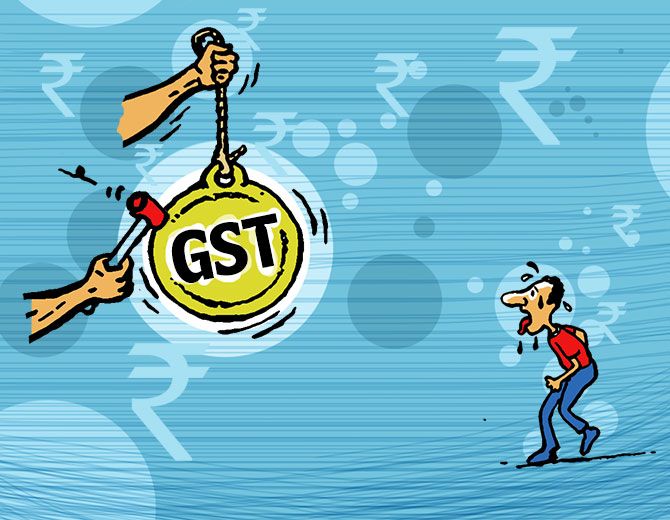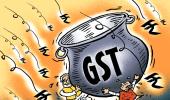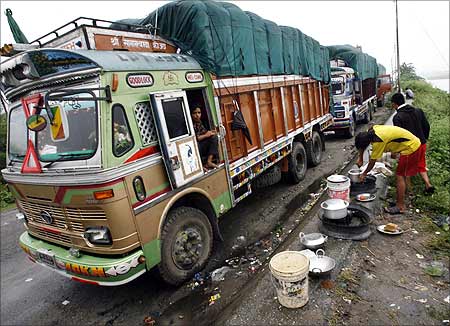'While the GST is structured to be an all-encompassing tax and to create a vastly expanded digital network of recorded transactions, no one knows how traders long used to avoiding taxes will apply their ingenuity,' says T N Ninan.
Illustration: Dominic Xavier/Rediff.com

As Benjamin Franklin wrote, nothing is certain in this world other than death and taxes.
India's experience with taxes has often been worse than death (which at least has finality to it!).
That is all the more reason to pause and celebrate the advent of the single-most important reform of the country's tax system since Independence.
The country's arrival at the stage of introducing a value-added tax that integrates treatment of goods and services, and covers both the Centre and states, is a massive achievement -- even if marked by the compromises and delays involved in getting anything done in India.
The result, perhaps inevitably, is not as clean or uncomplicated a tax as might have been wished for.
Further, we should be prepared for the possibility of operational problems as a transitional issue, while taxpayers will evidently need to be prepared for more paperwork and form-filling than they have been used to (the third certainty in this world, after death and taxes, is form-filling).
But these should not take away from the magnitude of the achievement, and the seminal importance of the change that is being introduced.
The tax has many fathers, but no mothers!
Still, it is a happy marriage of expert opinion with fiscal practice. Expanding on Shankar Acharya's listing of the GST's distinguished parentage in 2005, one must include at the intellectual level everyone from L K Jha, Raja Chelliah, and Amaresh Bagchi to M Govinda Rao and Vijay Kelkar.
The finance ministers who deserve a roll call of honour are V P Singh (who first introduced Modvat), Manmohan Singh (who expanded the scope of Modvat), Yashwant Sinha (who introduced the more ambitious Cenvat with a flat rate of 16 per cent), P Chidambaram (who moved the first Constitutional Amendment Bill on the GST) and now Arun Jaitley, who has overseen the project come to fruition.
State chief ministers also deserve much credit, as do successive chairmen of the empowered committee of state finance ministers -- Asim Dasgupta, Sushil Modi, and Amit Mitra.
Various central finance ministers encouraged and facilitated the states' move to a state VAT system -- an essential preparatory step.
Finally, Pranab Mukherjee got Nandan Nilekani to head the group whose work led to the creation of the new tax's information technology backbone, the GST Network, which will face its trial by fire.
The GST's promise is multi-faceted: It is expected to improve the coverage of the tax net, improve compliance by those in the net, increase therefore the ratio of taxes to gross domestic product (GDP), and thereby generate more resources for the government.
In the process, it is also expected to give a boost to GDP and, through forcible digitised recording of transactions for millions of new players, transform the country's business environment while also speeding up road transport (no more stoppages at state borders).
How exactly things will pan out, and whether or to what extent these potential benefits will be realised, will be known in the coming months and years.
Malaysia, often cited as among the more recent of the 140 countries that have introduced a GST, did not have an easy time of it.
And India's businessmen have a way of defeating the objectives of every solution that those in authority devise!
Six months after demonetisation, the level of digitised transactions has slipped back to the old levels, traders who had pulled out unused credit card machines have reverted to asking for cash payment, and cash is back in real estate transactions.
Vast ranges of products (like routine hardware items and sundry electronic and other gadgets) are habitually sold at the retail stage without anyone asking for bills, the former at significant discounts to the listed price.
While the GST is structured to be an all-encompassing tax and to create a vastly expanded digital network of recorded transactions, no one knows how traders long used to avoiding taxes will apply their ingenuity.
So, while hoping for a smooth changeover to a 'new, improved' way of doing things, fingers crossed!












 © 2025
© 2025